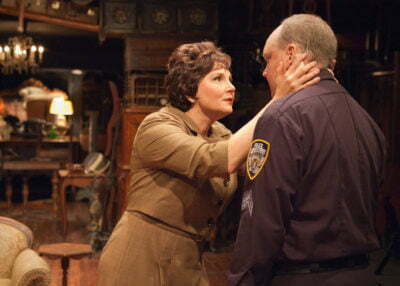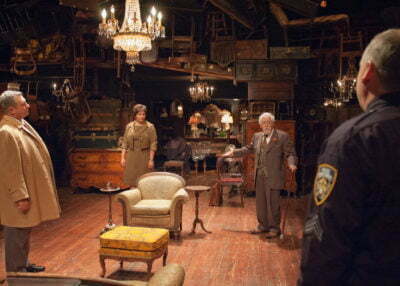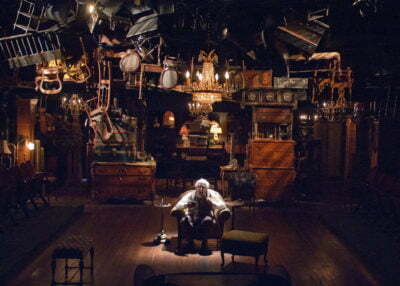The Price at TimeLine Theatre
Directed by Louis Contey
Produced by Timeline Theatre Company, Chicago
A Lifetime of Self-Deception Unravels
In The Wild Duck, Ibsen called it the “life-lie.” In The Iceman Cometh, O’Neill called it a “pipe-dream.” In The Price, Arthur Miller doesn’t have a specific term for the self-deception people practice to convince themselves they’re pursuing some kind of goal when they’re really just waiting to die, unless you want to interpret it as the American Dream in general, but he examines it in keen detail. It’s agonizing, because the characters are quite understandable, and it takes a while for us to understand the full extent of how much they’ve wronged themselves. But Miller’s writing in the 1968 play is at his finest (no “dast” here), and Timeline’s production, under the direction of Louis Contey, is an amazing confluence of superb actors, fully invested in unraveling their characters’ stories.

For sixteen years since his father died, Victor Franz (Bret Toumi, to be replaced by Terry Hamilton October 21), has allowed his vast collection of furniture to lie in the New York loft they lived in during the Great Depression, after the father lost his prestigious business and they were reduced to abject poverty. But now, the building is being torn down, and Victor has to finally get rid of the baggage. It comes at an awkward time; he is a police officer who loathed every minute of his job, but now has paid enough into his pension to retire fully. Retiring is what he’s been saying for decades would allow them to finally start living, his confused wife Esther (Kymberly Mellen) says, so why is he stalling? There is something, some trip, some project, he actually wants to do, isn’t there? Because she’s hated their marriage as much as he hated his job, and was under the impression that they were delaying happiness until they were financially secure. So, what now?
When the estate appraiser Victor hired, Gregory Solomon (Mike Nussbaum) shows up, Victor’s nerves are raw from the fight with his wife. But despite that Victor is naturally wary of him, and that Solomon indeed insists the furniture is unsellable to get a better price, the old man is charismatic and wise enough to put Victor at ease, and discovers a further complication. Truthfully, the furniture does not belong solely to Victor. He has a brother, Walter (Roderick Peeples), who became a doctor and medical researcher, while Victor gave up his dreams of science to care for their father during his depression. They’ve never been close since, and Victor blames his lack of support for his dismal life, though Victor felt duty-bound to invite him to the assessment. Solomon is very irritated to learn no deal can be made, but just then, Walter unexpectedly shows up. He has come to reconcile, he says, but his memory of what happened between the brothers is very different from Victor’s, and uncovering the truth proves more devastating than what they had chosen to believe about each other.

Though the dialogue sounds naturalistic, Contey framed it within a subtly exaggerated world. Brian Sidney Bembridge’s scenic design, dressed by Mary O’Dowd, is a floor-to-ceiling mountain of furniture that arcs over the heads of the audience members seated nearest to the theatre doors. Much of it looks heavy and antiquated—though Solomon’s doubts about selling it are doubtlessly part of his bargaining technique, I can’t imagine I would want any of it even if I had all the money in the world. Granted, the play takes place in 1968, when perhaps they didn’t look quite as dreary, but from a modern perspective, these dark, monumental chiffoniers and cupboards add further poignancy to Victor’s attempts to cling to his memory of a proud, benevolent father. Solomon is right when he says this kind of furniture is depressing to young people (who would now be middle-aged) because it’s too permanent, but the characters don’t seem to connect that with their 1920s prosperity really not having been permanent, regardless of what illusion the furnishings provided.

The brilliance of The Price is that while Victor is wrong in many ways, his mistakes are commonplace, and the other characters hardly have a right to condemn him. Tuomi, Mellen, and Peeples all capture their characters’ pride and deep-seated self-loathing. The only difference is that older brother Walter has already had his melt-down and worked his way through it, and Peeples is meticulous in shifting his balance of sympathy and frustration with Victor during the second act. As Victor and Ester, Tuomi and Mellen seem like they’d be kind people, were they not always in each other’s presence. Despite everything, you can still see Victor’s nostalgia on Tuomi’s face as he first enters the room, and come to realize over the course of the play how dangerous that nostalgia is. As the wily dealer, Nussbaum has the funniest role, and ironically, perhaps the one with the brightest future. While Walter is in the frightening position of starting over, and Victor and Ester are unsure whether they have the courage to do so despite their misery, Solomon is reinvigorated by the prospect of making his first deal in years. He’s nearly ninety, he tells the others, and after a difficult life thought it was time to fade away, when the challenge presented by the room put some spark back in him. Is Miller saying that’s how long people have to wait before they start living, or is he suggesting that some people don’t acquire the courage to do so until they’re at that point? It’s a sobering thought, but one worth contemplating. Though conventional aspirations have changed, The Price still strikes to the core of what people want for themselves.
Highly Recommended
Jacob Davis
This show has been Jeff recommended.
Playing at Timeline Theatre Company, 615 W Wellington Ave, Chicago. Tickets are $38-51; to order, call 773-281-8463 or visit timelinetheatre.com. Performances are Wednesdays and Thursdays at 7:30 pm, Fridays at 8:00 pm, Saturdays at 4:00 and 8:00 pm, and Sundays at 2:00 pm through November 22. Running time is two and a half hours with one intermission.

